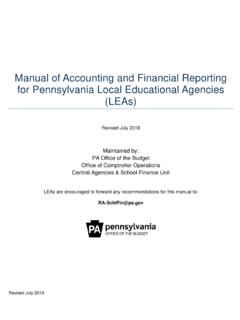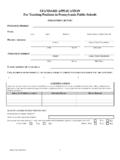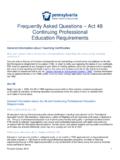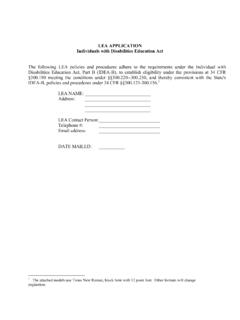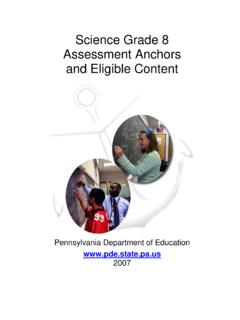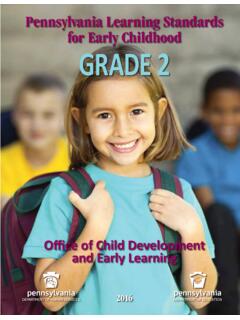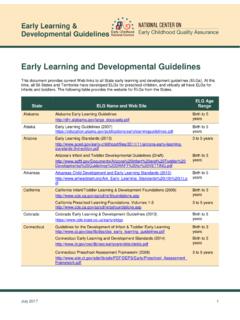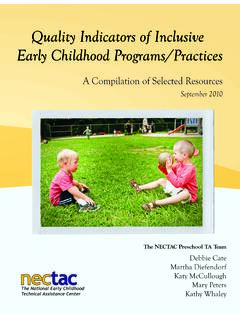Transcription of Pennsylvania Learning Standards for Early Childhood PRE ...
1 Pennsylvania Learning Standards for Early Childhood PRE- kindergarten Office of Child Developmentand Early Learning 2014 TABLE OF CONTENTS Introduction ..4 The Learning Standards Continuum .. 7 Guiding Principles .. 8 KEY Learning AREA: Approaches to Learning through Play Constructing, Organizing, and Applying Knowledge Standard Area : Constructing and Gathering Knowledge .. 11 Standard Area : Organizing and Understanding Information .. 12 Standard Area : Applying Knowledge .. 14 Standard Area : Learning through Experience .. 15 Approaches to Learning Glossary .. 17 KEY Learning AREA: Language and Literacy Development English Language Arts Standard Area : Foundational Skills.
2 19 Standard Area : Reading Informational Text .. 20 Standard Area : Reading Literature .. 23 Standard Area : Writing .. 26 Standard Area : Speaking and Listening .. 29 Language and Literacy Development Glossary .. 31 KEY Learning AREA: Mathematical Thinking and Expression Exploring, Processing, and Problem-Solving Standard Area : Numbers and Operations .. 34 Standard Area : Algebraic Concepts .. 35 Standard Area : Geometry .. 36 Standard Area : Measurement, Data, and Probability .. 38 Mathematical Thinking and Expression Glossary .. 40 KEY Learning AREA: Scientific Thinking and Technology Exploring, Scientific Inquiry, and Discovery Standard Area : Biological Sciences Living and Non-Living Organisms.
3 42 Standard Area : Biological Sciences Genetics .. 43 Standard Area : Biological Sciences Evolution .. 44 Standard Area : Physical Sciences Chemistry .. 44 Standard Area : Physical Sciences Physics .. 45 Standard Area : Earth and Space Sciences Earth Structures, Processes, and Cycles .. 47 Standard Area : Earth and Space Sciences Origin and Evolution of the Universe .. 48 Standard Area : Environment and Ecology Ecology .. 49 Standard Area : Environment and Ecology Watersheds and Wetlands .. 50 Standard Area : Environment and Ecology Natural Resources .. 50 Standard Area : Environment and Ecology Agriculture and Society .. 51 Standard Area : Environment and Ecology Humans and the Environment.
4 51 Standard Area : Computer and Information Technology .. 52 Scientific Thinking Glossary .. 55 Environment and Ecology Glossary .. 55 Computer and Information Technology Glossary .. 56 2 KEY Learning AREA: Social Studies Thinking Connecting to Communities Standard Area : Civics and Government Principles and Documents of Government .. 58 Standard Area : Civics and Government Rights and Responsibilities of Citizenship .. 58 Standard Area : Civics and Government How Government Works .. 59 Standard Area : Economics Scarcity and Choice .. 60 Standard Area : Economics Markets and Economic Systems .. 60 Standard Area : Economics Functions of Government.
5 61 Standard Area : Economics Income, Profit, and Wealth .. 61 Standard Area : Geography Basic Geographic Literacy .. 62 Standard Area : Geography Physical Characteristics of Places and Regions .. 62 Standard Area : History Historical Analysis and Skills Development .. 63 Social Studies Thinking Glossary .. 64 KEY Learning AREA: Creative Thinking and Expression Communicating through the Arts Standard Area : Production and Performance Music and Movement .. 66 Standard Area : Production and Performance Dramatic and Performance Play .. 67 Standard Area : Production and Performance Visual Arts .. 68 Standard Area : Historical and Cultural Context of Works in the Arts.
6 69 Standard Area : Critical Response to Works in the Arts .. 69 Standard Area : Aesthetic Response to Works in the Arts .. 70 Creative Thinking and Expression Glossary .. 70 KEY Learning AREA: Health, Wellness, and Physical Development Learning About My Body Standard Area : Concepts of Health .. 72 Standard Area : Healthful Living .. 73 Standard Area : Safety and Injury Prevention .. 74 Standard Area : Physical Activity Gross Motor Coordination .. 74 Standard Area : Concepts, Principles, and Strategies of Movement Fine Motor Coordination .. 75 Health, Wellness, and Physical Development Glossary .. 77 KEY Learning AREA: Social and Emotional Development Student Interpersonal Skills Standard Area : Self-Awareness and Self-Management.
7 79 Standard Area : Establishing and Maintaining Relationships .. 81 Standard Area : Decision-Making and Responsible Behavior .. 83 Social and Emotional Development Glossary .. 84 KEY Learning AREA: Partnerships for Learning Families, Early Care and Education Programs, and Communities Standard : Families are supported in times of need .. 86 Standard : Families experience relationships with Early care and education programs that are affirming, reciprocal, and build upon their strengths .. 88 Standard : Families have the support and information they need to encourage their children s Learning and development .. 90 Standard : Family members have support from other families.
8 92 Standard : Families have goals of their own and benefit from having supportive partners to help reach their goals .. 92 Standard : Families grow in their leadership and use these skills in many different ways .. 93 Standard : Families are supported in times of transition .. 94 Resources ..96 3 Learning Standards Development Pennsylvania s Learning Standards for Early Childhood were originally constructed as a joint project of the Departments of Education and Human Services . The Office of Child Development and Early Learning in col-laboration with the Office of Elementary and Secondary Education have overseen revisions to the Standards .
9 Each set of Standards has been formulated with help and guidance from practitioners and program special-ists who represented Early Childhood programs, school districts, higher education, family leaders, policy analysts, and researchers . A group of Pennsylvania educators, in conjunction with the Office of Child Devel-opment and Early Learning , created a set of Pennsylvania Core Standards beginning with Pre- kindergarten . The Pennsylvania Core Standards start in Pre- kindergarten and continue through 12th grade . The pennsyl -vania State Board of Education adopted the Pennsylvania Core Standards in March 2014 . The 2014 revisions include updates related to the Pennsylvania Core Standards ; Science, Technology, Engineering, and Math (STEM) supportive practices; and current research trends.
10 Learning Standards for Early Childhood are used to: Inform professionals about curriculum and assessment Guide the selection of instructional materials and the design of interactions/goal setting Inform families of appropriate expectations for children Provide a common framework for community-based birth grade 3 alignment work Learning Standards for Early Childhood are NOT used as: A specific curriculum A means to prohibit children from moving from one grade or age level to another Introduction Children are born with an incredible capacity and desire to learn . More than 40 years of research confirms the founda-tional importance of Early education and care for children s school and life success.
